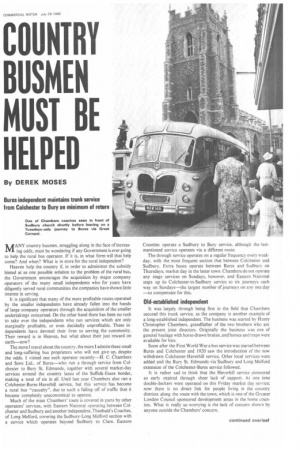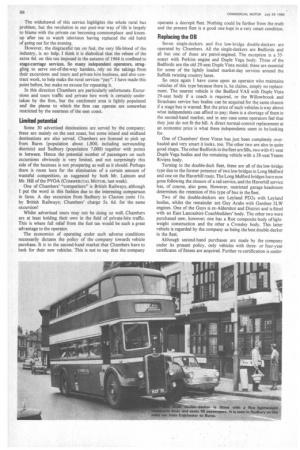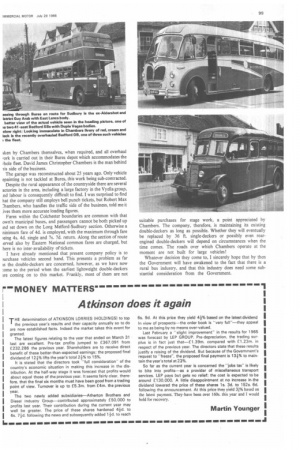COUNTRY BUSMEN MUST BE HELPED
Page 99

Page 100

Page 101

If you've noticed an error in this article please click here to report it so we can fix it.
By DEREK MOSES Bures independent maintains trunk service from Colchester to Bury on minimum of return MANY country busmen, struggling along in the face of increasing odds, must be wondering if any Government is ever going to help the rural bus operator. If it is. in what form will that help come? And when? What is in store for the rural independent?
Heaven help the country if, in order to administer the subsidy hinted at as one possible solution to the problem of the rural bus, the Government encourages the acquisition by major company operators of the many small independents who for years have diligently served rural communities the companies have shown little interest in serving.
It is significant that many Of the more profitable routes operated by the smaller independents have already fallen into the hands of large company operators through the acquisition of the smaller undertakings concerned. On the other hand there has been no rush to take over the independents who run services which are only marginally profitable, or even decidedly unprofitable. These independents have devoted their lives to serving the community. Their reward is in Heaven, but what about their just reward on earth—now?
The morel travel about the country, the more! admire these small and long-suffering bus proprietors who will not give up, despite the odds. I visited one such operator recently—H. C. Chambers and Sons Ltd., of Bures—who run a through service from Colchester to Bury St. Edmunds. together with several market-day services around the country lanes of the Suffolk-Essex border, making a total of six in all. Until last year Chambers also ran a Colchester-Bures-Haverhill service, but this service has become a rural bus "casualty", due to such a falling off of traffic that it became completely uneconomical to operate.
Much of the main Chambers' route is covered in parts by other operators' services, with Eastern National operating between Colchester and Sudbury and another independent, Theobald's Coaches, of Long Melford, covering the Sudbury-Long Melford section with a service which operates beyond Sudbury to Clare. Eastern Counties operate a Sudbury to Bury service, although the lastmentioned service operates via a different route.
The through service operates on a regular frequency every weekday. with the most frequent section that between Colchester and Sudbury. Extra buses operate between Bures and Sudbury on Thursdays, market day in the latter town. Chambers do not operate any stage services on Sundays, however, and Eastern National steps up its Colchester-to-Sudbury service to six journeys each way on Sundays—the largest number of journeys on any one day —to compensate for this.
Old-established independent It was largely through being first in the field that Chambers secured this trunk service, as the company is another example of a long-established independent. The business was started by Henry Christopher Chambers, grandfather of the two brothers who are the present joint directors. Originally the business was one of general haulage with horse-drawn brakes, and horses and traps were available for hire.
Soon after the First World War a bus service was started between Bures and Colchester and 1920 saw the introduction of the now withdrawn Colchester-Haverhill service. Other local services were added and the Bury St. Edmunds via Sudburyand Long Melford extension of the Colchester-Bures service followed.
It is rather sad to think that the Haverhill service pioneered so early expired through sheer lack of support. At one time double-deckers were operated on this Friday market day service; now there is no direct link for people living in the country districts along the route with the town, which is one of the Greater London Council sponsored development areas in the home counties. What is really so worrying is the lack of concern shown by anyone outside the Chambers' concern.
The withdrawal of this service highlights the whole rural bus problem, but the revolution in our post-war way of life is largely to blame with the private car becoming commonplace and kneesup after tea to watch television having replaced the old habit of going out for the evening.
However, the disgraceful tax on fuel, the very life-blood of the industry, is no help. I think it is diabolical that the rebate of the extra 6d. on this tax imposed in the autumn of 1964 is confined to stage-carriage services. So many independent operators, struggling to serve out-of-the-way hamlets, rely on the takings from their excursions and tours and private hire business, and also contract work, to help make the rural services "pay". I have made this point before, but make no excuse for repeating it.
In this direction Chambers are particularly unfortunate. Excursions and tours traffic and private hire work is certainly undertaken by the firm, but the catchment area is tightly populated and the places to which the firm can operate are somewhat restricted by the nearness of the east coast.
Limited potential
Some 30 advertised destinations are served by the company; these are mainly on the east coast, but some inland and midland destinations are also served. Chambers are licensed to pick up from Bures (population about 1,800, including surrounding districts) and Sudbury (population 7,000) together with points in between. Hence the potential number of passengers on such excursions obviously is very limited, and not surprisingly this side of the business is not prospering as well as it should. Perhaps there is room here for the elimination of a certain amount of wasteful competition, as suggested by both Mr. Lainson and Mr. Hal of the PVOA (COMMERCIAL MOTOR, last week).
One of Chambers' "competitors" is British Railways, although I put the word in this fashion due to the interesting comparison in fares. A day excursion from Sudbury to Clacton costs I Is. by British Railways; Chambers' charge 5s. 6d. for the same excursion!
Whilst advertised tours may not be doing so well, Chambers are at least holding their own in the field of private-hire traffic. This is where full relief from the fuel tax would be such a great advantage to the operator.
The economics of operating under such adverse conditions necessarily dictates the policy of the company towards vehicle purchase. It is to the second-hand market that Chambers have to look for their new vehicles. This is not to say that the company operates a decrepit fleet. Nothing could be further from the truth and the present fleet is a good one kept in a very smart condition.
Replacing the OB
Seven single-deckers and five low-bridge double-deckers are operated by Chambers. All the single-deckers are Bedfords and all but one of these are petrol-engined. The exception is a 35seater with Perkins engine and Duple Vega body. Three of the Bedfords are the old 29-seat Duple Vista model; these are essential for some of the lightly loaded market-day services around the Suffolk twisting country lanes.
So once again I have come upon an operator who maintains vehicles of this type because there is, he claims, simply no replacement_ The nearest vehicle is the Bedford VAS with Duple Vista 29-seat body if a coach is required, or the Willowbrook and Strachans service bus bodies can be acquired for the same chassis if a stage bus is wanted. But the price of such vehicles is way above what independents can afford to pay; there is a shortage of them in the second-hand market, and in any case some operators feel that they just do not fit the bill. A direct normal-control replacement at an economic price is what these independents seem to be looking for.
One of Chambers' three Vistas has just been completely overhauled and very smart it looks, too. The other two are also in quite good shape. The other Bedfords in the fleet are SBs, two with 41-seat Duple Vega bodies and the remaining vehicle with a 38-seat Yeates Riviera body.
Turning to the double-deck fleet, these are all of the low-bridge type due to the former presence of two low bridges in Long Melford and one on the Haverhill route. The Long Melford bridges have now gone following the closure of a rail service, and the Haverhill service has, of course, also gone. However, restricted garage headroom determines the retention of this type of bus in the fleet.
Two of the double-deckers are Leyland PD2s with Leyland bodies, whilst the remainder are Guy Arabs with Gardner 5LW engines. One of the Guys is ex-Aldershot and District and is fitted with an East Lancashire Coachbuilders' body. The other two were purchased new, however; one has a Roe composite body of lightweight construction and the other a Crossley body. This latter vehicle is regarded by the company as being the best double-decker in the fleet.
Although second-hand purchases are made by the company under its present policy, only vehicles with threeor four-year certificates of fitness are acquired. Further re-certification is under aken by Chambers themselves, when required, and all overhaul rork is carried out in their Bures depot which accommodates the thole fleet. David James Christopher Chambers is the man behind us side of the business.
The garage was reconstructed about 25 years ago. Only vehicle epainting is not tackled at Bures, this work being sub-contracted.
Despite the rural appearance of the countryside there are several actories in the area. including a lame factory in the Vyella group, nd labour is consequently difficult to find. I was surprised to find hat the company still employs bell punch tickets, but Robert Max :hambers, who handles the traffic side of the business, told me it ives them more accurate loading figures.
Fares within the Colchester boundaries are common with that own's municipal buses, and passengers cannot be both picked up Lnd set down on the Long Melford-Sudbury section. Otherwise a ninimum fare of 4d. is employed, with the maximum through fare eing 4s. 4d. single and 7s. 7d. return. Along the section of route erved also by Eastern National common fares are charged, but here is no inter-availability of tickets.
I have already mentioned that present company policy is to mrchase vehicles second hand. This presents a problem as far is the double-deckers are concerned, however, as we have now :ome to the period when the earliest lightweight double-deckers ire coming on to this market. Frankly, most of them are not suitable purchases for stage work, a point appreciated by Chambers. The company, therefore, is maintaining its existing double-deckers as long as possible. Whether they will eventually be replaced by 36 ft. single-deckers or possibly even rearengined double-deckers will depend on circumstances when the time comes. The roads over which Chambers operate at the moment are not built for large vehicles!
Whatever decision they come to, I sincerely hope that by then the Government will have awakened to the fact that there is a rural bus industry, and that this industry does need some substantial consideration from the Government.
































































































































































